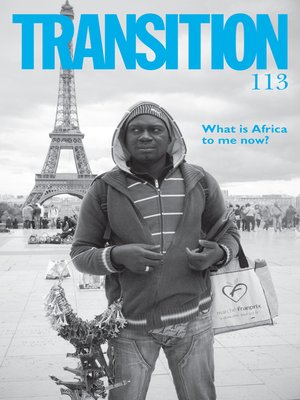
Sign up to save your library
With an OverDrive account, you can save your favorite libraries for at-a-glance information about availability. Find out more about OverDrive accounts.
Find this title in Libby, the library reading app by OverDrive.



Search for a digital library with this title
Title found at these libraries:
| Library Name | Distance |
|---|---|
| Loading... |
Published three times per year by Indiana University Press for the Hutchins Center at Harvard University, Transition is a unique forum for the freshest, most compelling ideas from and about the black world. Since its founding in Uganda in 1961, the magazine has kept apace of the rapid transformation of the African Diaspora and has remained a leading forum of intellectual debate. In issue 113, Transition updates Countee Cullen's iconic question by asking, "What is Africa to me now?" A soul-searchingly private query, its ramifications nevertheless play out in profoundly public ways, around issues of immigration, racial and ethnic tension, and the search for belonging. Guest edited by Benedicte Ledent and Daria Tunca, in this cluster Madhu Krishnan takes Achebe's Things Fall Apart as a starting point for defining contemporary African literature, while Louis Chude-Sokei explores through their novels the experiences of Africans living in America. Julie Kleinman reveals the perspective of Malian immigrants in France, and photographer Johny Pitts searches Europe with his camera for what he calls "Afropeans." Meanwhile, celebrated author and editor Hilton Als has his own questions about diaspora, which he explores in recollections of a childhood summer in Barbados. Caribbean Canadian novelist David Chariandy also treats Transition readers to a sneak preview of his forthcoming novel, Brother. The issue concludes with a suite of essays that examine the social impacts of collective fear, and ask—given obvious parallels between the Rodney King beating and the murder of Trayvon Martin—why does this keep happening to young black men?







